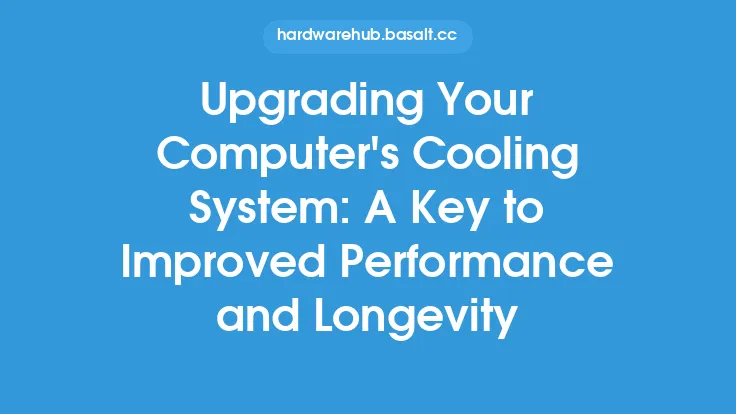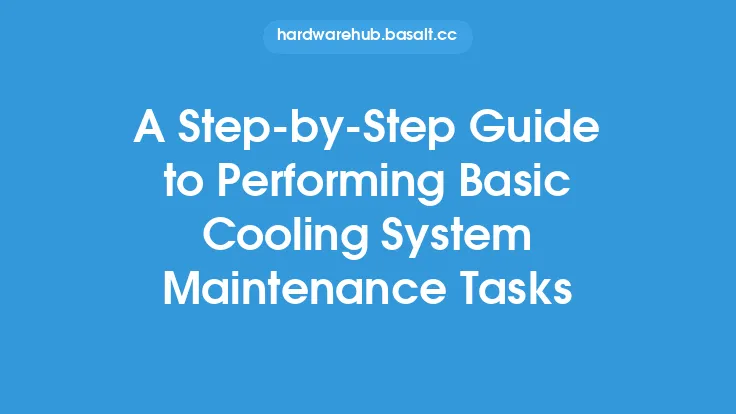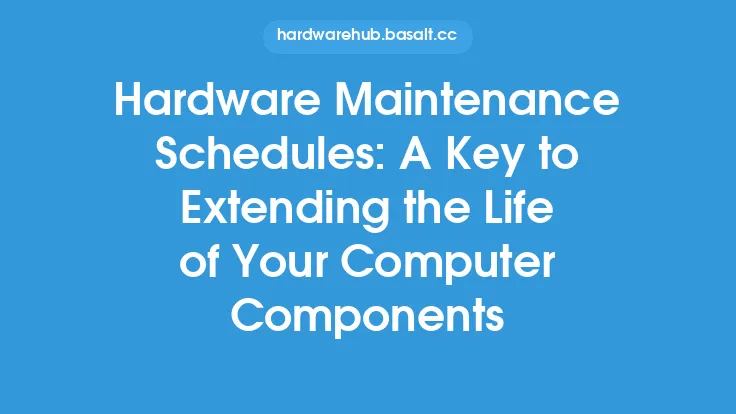Proper maintenance is essential to extend the lifespan of your cooling system, ensuring it operates efficiently and effectively over time. A well-maintained cooling system can help prevent overheating, reduce the risk of component failure, and minimize the need for costly repairs. In this article, we will delve into the world of cooling system maintenance, exploring the various techniques and strategies that can help you get the most out of your cooling system.
Introduction to Cooling System Maintenance
Cooling system maintenance involves a range of activities, from simple cleaning and inspection tasks to more complex procedures like fluid replacement and component repair. The goal of maintenance is to identify and address potential issues before they become major problems, ensuring your cooling system continues to operate at peak performance. Regular maintenance can help extend the lifespan of your cooling system, reduce energy consumption, and prevent damage to surrounding components.
Understanding Cooling System Components
To maintain your cooling system effectively, it's essential to understand the various components that make up the system. These may include heat exchangers, fans, pumps, and radiators, among others. Each component plays a critical role in the cooling process, and neglecting any one of them can lead to reduced system performance and increased risk of failure. For example, a faulty fan can cause a heat exchanger to overheat, while a clogged radiator can prevent the system from dissipating heat effectively.
Maintenance Techniques for Cooling Systems
There are several maintenance techniques that can help extend the lifespan of your cooling system. These include:
- Cleaning: Regular cleaning is essential to remove dirt, dust, and other debris that can accumulate on cooling system components. This can be done using compressed air, soft brushes, or mild cleaning solutions.
- Inspection: Regular inspections can help identify potential issues before they become major problems. This may involve checking for signs of wear, corrosion, or damage on components like hoses, belts, and fittings.
- Fluid replacement: Many cooling systems rely on fluids like water, glycol, or refrigerants to transfer heat. Regular fluid replacement can help maintain system performance and prevent corrosion.
- Filter maintenance: Air filters and other types of filters can become clogged over time, reducing system performance and increasing energy consumption. Regular filter cleaning or replacement can help maintain airflow and system efficiency.
Advanced Maintenance Techniques
In addition to basic maintenance techniques, there are several advanced strategies that can help extend the lifespan of your cooling system. These include:
- Performance monitoring: Regular monitoring of system performance can help identify potential issues before they become major problems. This may involve tracking parameters like temperature, flow rate, and pressure.
- Predictive maintenance: Predictive maintenance involves using data and analytics to predict when maintenance is required. This can help reduce downtime, minimize repair costs, and optimize system performance.
- Component replacement: In some cases, it may be necessary to replace components like pumps, fans, or heat exchangers to maintain system performance. This can be a complex and costly process, but it can help extend the lifespan of your cooling system.
Best Practices for Cooling System Maintenance
To get the most out of your cooling system, it's essential to follow best practices for maintenance. These include:
- Developing a maintenance schedule: Regular maintenance is essential to extend the lifespan of your cooling system. Developing a maintenance schedule can help ensure that tasks are performed on time and that potential issues are identified before they become major problems.
- Using proper tools and equipment: Using the right tools and equipment can help ensure that maintenance tasks are performed safely and effectively.
- Following manufacturer guidelines: Manufacturer guidelines can provide valuable information on maintenance procedures, component replacement, and system operation.
- Keeping records: Keeping records of maintenance activities can help track system performance, identify potential issues, and optimize maintenance schedules.
Common Mistakes to Avoid
When maintaining your cooling system, there are several common mistakes to avoid. These include:
- Neglecting regular maintenance: Regular maintenance is essential to extend the lifespan of your cooling system. Neglecting maintenance tasks can lead to reduced system performance, increased energy consumption, and costly repairs.
- Using incorrect fluids: Using the wrong type of fluid can damage system components, reduce performance, and increase the risk of corrosion.
- Overlooking component condition: Failing to inspect and maintain components like hoses, belts, and fittings can lead to reduced system performance and increased risk of failure.
- Ignoring system alarms: System alarms can provide valuable information on potential issues. Ignoring these alarms can lead to reduced system performance, increased energy consumption, and costly repairs.
Conclusion
Proper maintenance is essential to extend the lifespan of your cooling system, ensuring it operates efficiently and effectively over time. By understanding cooling system components, following best practices for maintenance, and avoiding common mistakes, you can help optimize system performance, reduce energy consumption, and minimize the need for costly repairs. Whether you're a seasoned maintenance professional or a DIY enthusiast, the techniques and strategies outlined in this article can help you get the most out of your cooling system and ensure reliable operation for years to come.





